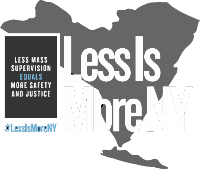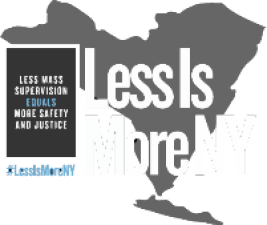Frequently Asked Questions
#LessIsMoreNY changes parole from a punitive system to an incentive-based system through earned time credits (or the “30 for 30”). Beginning March 1, 2022, people on parole now earn 30 days off their parole supervision period for every 30 days they go without a sustained violation. This means that if someone remains violation-free, they can cut their time on parole in half. It applies to both parole and post-release supervision.
People serving life sentences unfortunately will not benefit from this provision; there is a discretionary discharge mechanism available to people with life sentences that was not changed by Less is More. Everyone else on parole, regardless of conviction or type of sentence will receive earned time credits.
On March 1, 2022, DOCCS began to calculate and award the 30 for 30 earned time credits going forward, as well as the retroactive credits, and they anticipate awarding all retroactive earned time credits by July 15, 2022. Each person eligible for earned time credits can receive a maximum of two years of retroactive credits. For example, if you have been on parole for 3 years as of March 1, 2022 with no sustained violations, you will receive two years of retroactive credits and then earn 30 for 30 going forward from that date until you are discharged from parole. If you were incarcerated on a violation when this provision took effect, then your retroactive credits would not be awarded until you are released and restored to community supervision. You will not earn retroactive credits for any period you were incarcerated on a sustained violation – only for periods when you were in the community. DOCCS is currently behind on awarding the post-March 1 credits, but everyone will receive all the credits they are owed. DOCCS anticipates being caught up by the end of July.
No. Earned time credits are yours once they have been awarded; you cannot lose credits once you have earned them. If you receive a sustained violation, parole can withhold credits for the 30-day period starting with the date of the violation, but you will not lose any credits you already earned prior to the violation. If the sustained violation is for absconding, the earned time credits will be withheld for the entire absconding period. The clock for earning credits starts again automatically on day 31 unless you are incarcerated. If you are incarcerated on day 31, it will start again on the day you are released and restored to community supervision.
No. Under #LessIsMoreNY, if you are accused of any technical violation, including special conditions, parole is required to give you a written notice of violation rather than arrest you. The written notice of violation is like an appearance ticket: it will tell you when and where to show up for your hearing, and as long as you appear, you will not be detained while your hearings are conducted. It’s possible that if the violation is sustained you could be incarcerated for violating certain special conditions if parole can prove that they have exhausted all community-based options for addressing the violation. If you are incarcerated, it will be for a maximum of 30 days.
Yes. Under #LessIsMoreNY, people accused of a new crime while on parole will get what’s called a recognizance hearing rather than automatically being detained because of the parole sticker. Recognizance hearings began on March 1, 2022 and must be conducted within 24 hours from the execution of a warrant. The standard for release at the recognizance hearing is the same as at the bail hearing on the new charge: the court will release the person on their own recognizance (ROR) unless this will not reasonably assure the person’s appearance at subsequent hearings (if the person is a flight risk).
#LessIsMoreNY does not alter current penalties for new crimes, but all individuals on parole will have the right to de novo review by a judge of the sustained violation and its punishment. This is similar to an appeal, which was not an option under the old law, and means the judge conducting the review can do so without consideration of the findings of the parole revocation hearings or the criminal court hearings on the case.
All provisions of the #LessIsMoreNY Act have gone into effect, except for the application of retroactive earned time credits. DOCCS anticipates that they will finish awarding retroactive earned time credits by July 15, 2022, at which point the law will be fully implemented.
Every person on parole has a list of release conditions that they must follow. A technical violation occurs when a person breaks one of these rules which is not a new crime (misdemeanor or felony). Examples of technical violations include, but are not limited to: being late for curfew, testing positive for drugs or alcohol, and missing an appointment with a parole officer.

